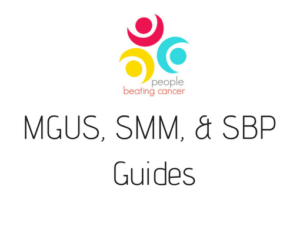
Diagnosed with SMM, SPB, or MGUS?
Learn how you can stall the development of full-blown Multiple Myeloma with evidence-based nutritional and supplementation therapies.
Click the orange button to the right to learn more.
- You are here:
- Home »
- Blog »
- Pre-Myeloma »
- MGUS-IgG Kappa Diagnosis and Freaked Out!
MGUS-IgG Kappa Diagnosis and Freaked Out!

The rate of transformation of monoclonal gammopathy of undetermined significancer (MGUS) to MM or other lymphoproliferative diseases is 1% per year
- MM Survivor
- MM Cancer Coach
- Director PeopleBeatingCancer
Recommended Reading:
Patterns of survival and causes of death following a diagnosis of monoclonal gammopathy of undetermined significance: a population-based study
“We compared the survival of 4,259 patients with monoclonal gammopathy of undetermined significance, collected from hematology outpatient units in Sweden, with the survival of the general population by computing relative survival ratios. We also compared causes of death in these patients with those in 16,151 matched controls…
It was reported that the risk of malignant transformation was higher for IgM MGUS than for IgG MGUS.5 In our study, we found similar cause-of-death patterns by MGUS subtype…
-
Conclusions-
Our finding of decreased life expectancy in patients with monoclonal gammopathy of undetermined significance, which was most pronounced in the elderly and explained by both malignant transformation and non-malignant causes, is of importance in the understanding and clinical management of this disease.
The underlying mechanisms may be causally related to the gammopathy, but may also be explained by underlying disease that led to the detection of the hematologic disease. Our results are of importance since they give a true estimation of survival in patients with monoclonal gammopathy of undetermined significance diagnosed in clinical practice.
- In summary, we found that individuals diagnosed with MGUS in a clinical setting had a significantly reduced life expectancy. The rate of transformation of MGUS to MM or other lymphoproliferative diseases is 1% per year;5,6 however, the majority of MGUS patients are diagnosed as a result of a clinical investigation for different medical reasons, and were found to die from other causes. The observed excess mortality was particularly pronounced among elderly MGUS patients…”


